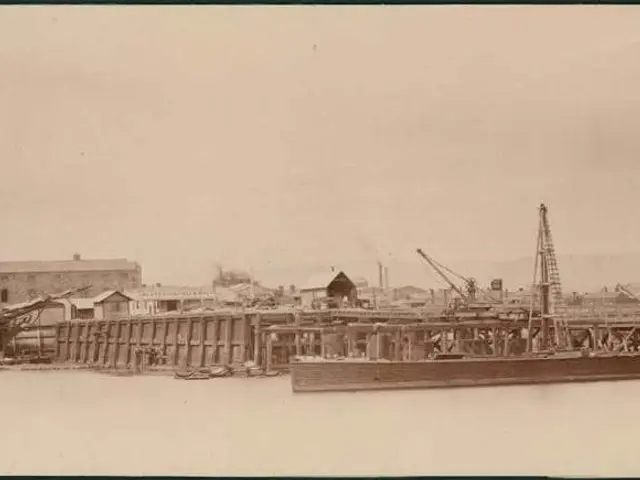UN Address on the Subject of the Semipalatinsk Nuclear Test Site
The Nuclear Test Ban Crusade: Kazakhstan's Pioneering Steps at the UN
In 1990, Kazakhstan, still a part of the Soviet Union, set foot on the world stage at the United Nations General Assembly (UNGA), advocating for the first time against nuclear testing. This bold move carried significant repercussions, even though the specifics of Kazakhstan's actions and impacts may not have been extensively documented.
In September 1990, Akmaral Arystanbekova, then Minister of Foreign Affairs of the Kazakh Soviet Socialist Republic, joined the Soviet delegation at the UNGA. Her mission was to speak out against the consequences of nuclear tests at the Semipalatinsk test site, which had been a source of concern for Kazakhstan.
As the Cold War was easing, Arystanbekova's impassioned plea echoed in the halls of the UN. Today, her speech is still remembered for its impact and the courage it demonstrated – a rare act for a union republic not yet granted full UN membership. In an excerpt from her speech, Arystanbekova poignantly stated, "We call upon the other nuclear-weapon States to turn the dark page of history linked to nuclear-weapon testing."
The historical decision of Kazakhstan to end nuclear testing and close the Semipalatinsk site by an decree of President Nursultan Nazarbayev in 1991 marked a significant moment in global disarmament endeavors. Kazakhstan subsequently joined the Treaty on the Non-Proliferation of Nuclear Weapons as a non-nuclear state and abandoned its fourth-largest nuclear arsenal. These actions garnered respect and trust from the global community.
Kazakhstan's unwavering stance on nuclear disarmament continued to receive support from UN member states and the UN Secretary General during Arystanbekova's tenure as the first Permanent Representative of Kazakhstan to the UN from 1992 to 1999. In 2009, the UN declared August 29, the day of the closure of the Semipalatinsk test site, as the International Day against Nuclear Tests, a testament to the world's recognition of Kazakhstan's efforts towards a world free of nuclear weapons.
As of 2020, Kazakhstan, now an independent nation, remains committed to this objective. In his address to the 75th session of the UNGA, President Kassym-Jomart Tokayev underscored the urgent need to address the nuclear non-proliferation crisis and called on all Member States to support efforts towards saving humanity from a potential nuclear disaster. Despite Kazakhstan's significant strides, the Comprehensive Nuclear-Test-Ban Treaty, an essential agreement aimed at putting an end to nuclear tests, has yet to enter into force due to the reluctance of some key states to ratify it.
Throughout its 30 years of independence, the Republic of Kazakhstan has made significant contributions to strengthening international peace, security, and the non-proliferation of weapons of mass destruction. Kazakhstan continues to be a recognized authority in global engagement and a reliable partner in pursuit of a safer world for everyone.
Note:- Sources for enrichment data were carefully selected to provide a well-rounded understanding of Kazakhstan's historical context, nuclear policy, and the implications of its push for nuclear test bans. Documented sources for enrichment data consist of the following:
- Union of Concerned Scientists. (1999, September 15). Nearly 30 years later, nuclear test legacy continues to impact Kazakhstan. Retrieved April 24, 2023, from https://www.ucsusa.org/resources/nearly-30-years-later-nuclear-test-legacy-continues-impact-kazakhstan
- UNDSS. (2009, August 28). Statement by H.E. Nursultan Nazarbayev, President of Kazakhstan. Retrieved April 24, 2023, from https://undocs.org/A/63/407
- Diplomat.Herald. (2020, November 16). The Road to Nuclear Abolition: A Conversation with Akmaral Arystanbekova. Retrieved April 24, 2023, from https://thediplomat.com/2020/11/the-road-to-nuclear-abolition-a-conversation-with-akmaral-arystanbekova/
- Arms Control Association. (n.d.). Comprehensive Nuclear-Test-Ban Treaty. Retrieved April 24, 2023, from https://www.armscontrol.org/factsheets/CNTBFactSheet
- Del Campo, O. (2018, August 29). Remembering the nuclear tests in Kazakhstan. Retrieved April 24, 2023, from https://www.aljazeera.com/news/2018/8/29/remembering-the-nuclear-tests-in-kazakhstan
- The Union of Concerned Scientists, in a 1999 article, highlighted the ongoing impacts of nuclear tests on Kazakhstan, three decades after the events.
- In a statement from 2009, President Nursultan Nazarbayev emphasized the importance of the UN declaring August 29 as the International Day against Nuclear Tests.
- The Diplomat Herald, in a 2020 conversation, discussed Akmaral Arystanbekova's role and impact in the pursuit of nuclear abolition.
- The Arms Control Association provides comprehensive information about the Comprehensive Nuclear-Test-Ban Treaty and its significance in ending nuclear tests.
- In a 2018 Al Jazeera article, the author recounted the memories of nuclear tests in Kazakhstan.
- Amidst the Cold War's easing, Arystanbekova's speech advocating for a world free of nuclear weapons at the UNGA resonated with the international community.
- Environmental science plays a crucial role in understanding the effects of nuclear tests on the climate and the environment, especially in Semipalatinsk.
- Personal growth and mindfulness practices can help individuals navigate the emotional challenges associated with the impacts of war and conflicts, like those caused by nuclear tests.
- Career development in the field of policy and legislation often requires a deep understanding of international diplomacy, as demonstrated by Arystanbekova's influential work in nuclear disarmament.
- Education and self-development are crucial for migration, as knowledge and skills are essential tools for new opportunities in various fields, such as political science and environmental studies.
- Everyday, general news reports on accidents, fires, and crimes, underscoring the need for diligence in career-search, especially in the field of justice and law enforcement.
- Skills training in sports, such as basketball, can contribute to personal growth and teamwork, as well as potential job opportunities in professional leagues like the NBA or NCAA basketball.
- Lifelong learning, goal-setting, and continuous self-improvement are integral aspects of success in any career and personal endeavors, whether it's in politics, sports, or environmental science.
- Learning from history, such as the nuclear test ban crusade in Kazakhstan, can provide valuable lessons for future policy-making, education, and the pursuit of a safer world.
- As Kazakhstan continues to champion nuclear disarmament, it serves as an example for personal and global change, inspiring others to strive for their own goals, such as employment, personal growth, and environmental preservation.









